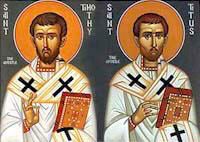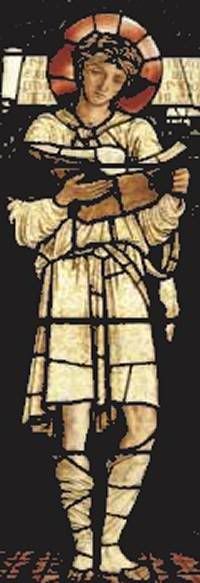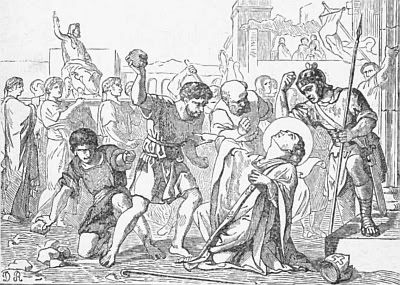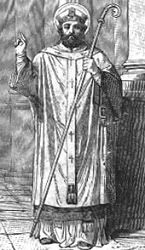Today, January 26, we celebrate the feast day of Saints Timothy and Titus, early disciples of the Church, missionaries in spreading the word of God, and faithful and trusted friends of Saint Paul. While their lives were quite different from each other, they are celebrated together, in remembrance for their courage, zeal, and dedication to Christ in the most difficult of times.
Saint Timothy (birth unknown, deceased 97 AD) was born in Lystra, Lycaenia, the son of a Greek father and Jewish mother. As a child, he spent considerable time studying the Holy Scriptures, devoting himself to the Holy Spirit. Upon Saint Paul’s first visit to Lycaenia, Timothy was just a child, but his mother and grandmother, whose faith Paul commends, converted to Christianity. Upon Paul’s second return, approximately seven years later, Timothy, now a young man, followed him, becoming a discipline, confidant, and friend.
Saint Timothy traveled throughout the Mediterranean and Asia (Phrygia, Galatia and Mysia, Troas, Philippi, Veria, Thessolonica, and Corinth) with Saint Paul, oftentimes the discipline sent ahead to prepare a city, or left behind to guide a new church. Timothy, known for a gentle disposition was the discipline whom Paul relied upon to smooth out hard feelings and restore faith in angered Jewish communities, such as Berea (which Paul was expelled from). Timothy was imprisoned with Paul in Caesarea and then Rome, but later freed while Paul remained. Saint Paul wrote two letters to Timothy, regarding him as his “own son in faith,” one from Macedonia and the second from his Roman prison.
Timothy, regarded as tender and affectionate, lived a life of sacrifice and austerity. We know that he drank only water, likely as penance, and was frequently sick with stomach complaints and ailments. While he may have been timid in life, Timothy was a Christian force of virtue, gentle, humble, and committed to the teachings of Christ. His demeanor won him the hearts of the most difficult communities, leading to successful conversion. He was made bishop of Ephesus, where he was stoned to death, martyred for opposing the pagan festival of Katagogian in honor of Diana.
Like Saint Timothy, Saint Titus (birth unknown, death 94 AD) was a close friend of Saint Paul, and accompanied him on many of his missionary works throughout the Mediterranean and Asia (Ephesus, Corinth, Macedonia, Crete, Dalmatia). Unlike, Saint Timothy, Titus was known as a firm and somewhat fear-inspiring disciple of Paul, sent not to smooth over difficulties, but deliver difficult news and inspire faith and repentance.
Saint Titus is viewed as a great administrator of the early Church, responsible for correcting abuses, encouraging alms-giving, and modeling discretion and correction of scandal. Saint Titus was dispatched by Paul to Corinth (where he was received with “fear and trembling”), to increase the charity of the community, while cementing their faith. This he did with zeal, firmly re-establishing the Church in Corinth prior to Paul’s return. Firm though he was, Titus was also patient, and the first among any group to point out the goodness in others, even when it was hidden.
Little is known about the death of Saint Titus. Installed as bishop on the island of Crete, he died of apparent natural causes, rare in that time for Christian missionaries! His remains are buried at Saint Mark’s Cathedral in Venice.
We look to the lives of two very different men today, Saints Timothy and Titus, and their dedication and zeal for the word of God. Each used the gifts that were provided to them by the Lord to spread the truth of the Gospel—one with humility, affection, and a gentle spirit, the other with firmness, sympathy, charity, and respect. Both were united in their love of Christ, and their friendship with Saint Paul. It is the friendship, which Paul writes about in his Epistles to both Timothy and Titus, that sustains and brings comfort during the difficult times of travel, separation, persecution, and imprisonment. Who are our own brothers and sisters and “sons in faith?” Who do we rely on to offer us not only support, but accountability in Christ? We pause today to pray for those in our lives who help keep us on the right path, looking to Saints Paul, Timothy, and Titus as a model of Christian love and friendship.
Day 26 of 365
Prayer Intentions: Strengthening of Christian friendship and accountability; Those suffering in the aftermath of the Haitian earthquake
Requested Intentions: Reconciliation and Healing in personal relationships (N); Safety for friend deployed to Afghanistan (S); Those considering or having attempted suicide (Pr. L); Those who serve the Archdiocese of Los Angeles (N); Safety of friend/ relief worker in Haiti (L); Health and safety of new daughter (J); Renewal of loving Christ-centered relationship (A).
Why pray the Rosary every day for a year?
Each time the Blessed Virgin has appeared-- whether it be to Saint Bernadette Soubirous at Lourdes; to Lucia, Jacinta, and Francisco at Fatima; or to Mariette Beco at Banneux-- she has asserted the importance, saving grace, and power of praying the Holy Rosary on a daily basis. Based upon her words, the Rosary is penance and conversion for sinners, a pathway to peace, an end to war, and a powerful act of faith in Jesus Christ. Pope Paul VI presented the Rosary as a powerful means to reach Christ "not merely with Mary but indeed, insofar as this is possible to us, in the same way as Mary, who is certainly the one who thought about Him more than anyone else has ever done."
To show us how this is done, perhaps no one has been more eloquent than the great Cardinal Newman, who wrote: "The great power of the Rosary consists in the fact that it translates the Creed into Prayer. Of course, the Creed is already in a certain sense a prayer and a great act of homage towards God, but the Rosary brings us to meditate again on the great truth of His life and death, and brings this truth close to our hearts. Even Christians, although they know God, usually fear rather than love Him. The strength of the Rosary lies in the particular manner in which it considers these mysteries, since all our thinking about Christ is intertwined with the thought of His Mother, in the relations between Mother and Son; the Holy Family is presented to us, the home in which God lived His infinite love."
As Mary said at Fatima, "Jesus wants to use you to make Me known and loved. He wishes to establish the devotion to My Immaculate Heart throughout the world. I promise salvation to whoever embraces it; these souls will be dear to God, like flowers put by Me to adorn his throne."

Subscribe to:
Post Comments (Atom)










0 comments:
Post a Comment
Thanks for leaving a comment. If you wish to submit a prayer request, however, please do so above, using the "Contact" tab.